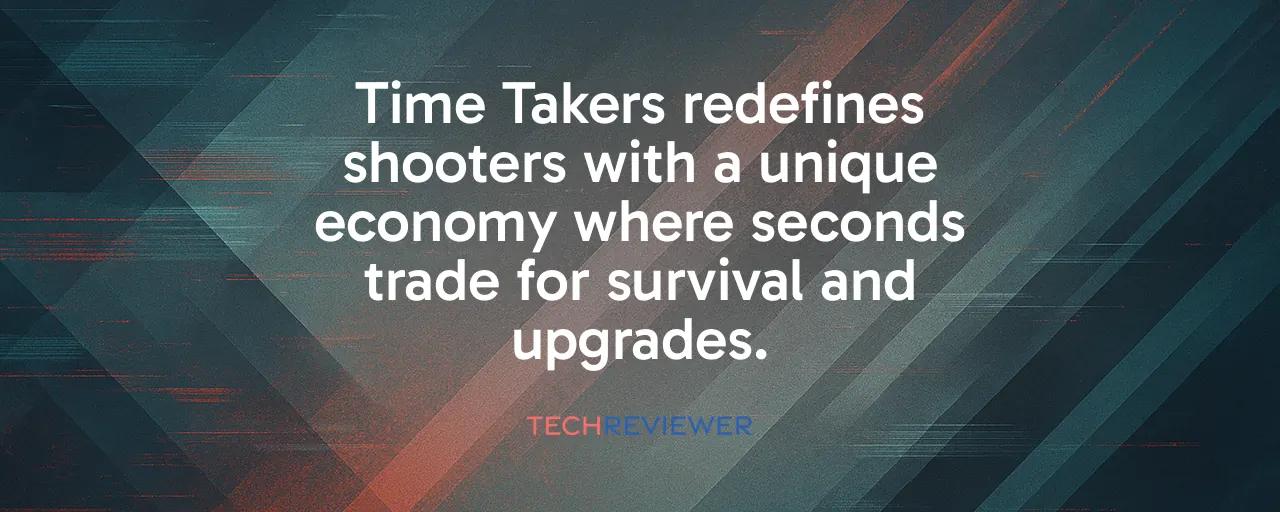A New Kind of Shooter
In a chaotic Time Takers match, your team's survival hangs on a dwindling timer. Every second counts, not just for staying alive but as currency to buy revives, upgrades, or game-changing moves. Announced at Gamescom 2025, this free-to-play survival shooter from Mistil Games and NCSoft, set for a 2026 PC and console launch, flips the genre's formula. By treating time as a tradable resource, it forces players to weigh every action, from rushing an enemy to saving a teammate, in a high-stakes economy unlike anything in today's shooters.
The concept landed with a splash during its reveal, with Unreal Engine 5 visuals showcasing sprawling maps and dynamic lighting. Early Steam playtest sign-ups and demo footage hint at a game that thrives on constant decision-making. Will Time Takers deliver a fresh competitive edge, or will its bold mechanic overwhelm players? The answer lies in how its systems hold up under pressure.
Time as Power
At its core, Time Takers redefines survival shooters by making 'Time Energy' both your health bar and your wallet. Need to revive a teammate? Spend seconds. Want a better weapon? Trade time. Gamescom trailer footage showed 3v3v3 skirmishes where players swapped Time Energy to clutch victories, with in-world crystals and pick-ups fueling the action. This setup, a departure from shrinking-circle battle royales like PUBG, pushes teams toward aggressive plays and organic clashes, echoing the extraction-shooter trend seen in Escape from Tarkov.
A smaller-scale precedent, MetaDOS in 2024, toyed with time-as-life mechanics but lacked the polish and backing of NCSoft. Time Takers builds on that idea with role-agnostic characters and mix-and-match arsenals, letting players craft builds mid-match. While this freedom sparks creativity, skeptics worry the constant time drain could frustrate casual players, especially if the HUD, tracking shared and personal time pools, feels cluttered or unintuitive.
Building a Fair Arena
For Time Takers to thrive, its tech needs to match its ambition. The time-as-currency system demands precise server-side accounting to prevent desync exploits, where a laggy tick could cost a match. Matchmaking also faces scrutiny. Skill-based systems, like those in Valorant, balance player skill and latency but can stretch queue times. Valorant's 2020 launch faced backlash over its kernel-level anti-cheat, which players found intrusive. Mistil Games needs to communicate clearly about its anti-cheat plans, likely involving vendors like BattlEye, to build trust.
Monetization poses another hurdle. NCSoft's free-to-play model, leaning on cosmetic battle passes themed around historical eras, needs to avoid 'time-boost' purchases that feel pay-to-win. The FTC's action on Genshin Impact's loot-box practices serves as a warning: transparency is critical to avoid regulatory heat or player distrust. Robust anti-cheat and fair monetization will decide if Time Takers can court competitive streamers and casuals alike.
Eyes on the Esports Prize
Can Time Takers carve a spot in the esports scene? Its time mechanic offers broadcasters rich storytelling tools, with server-side telemetry revealing clutch trades and desperate revives. Studies show such data streams boost viewer engagement, but only if matches feel fair. NCSoft's push into shooters, moving beyond its MMORPG roots like Guild Wars, mirrors Riot Games' Valorant leap in 2020. Time Takers needs to balance its high-stakes design to avoid alienating newcomers, who might find the time-pressure overwhelming without strong tutorials.
Open telemetry APIs could let third-party stat sites thrive, fostering community investment. Cultural sensitivity matters, historical characters, spanning eras, need careful localization to avoid caricature. If Mistil Games nails accessibility and fairness, Time Takers could spark a new competitive wave by 2026, blending adrenaline with strategy in a way shooters haven't seen before.
